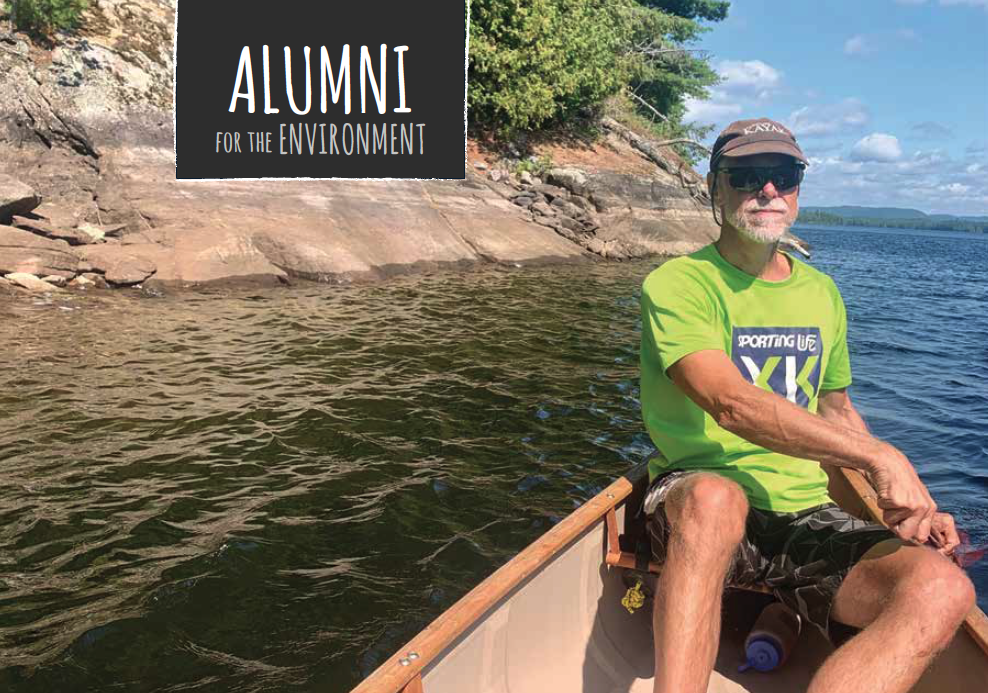
As a senior at Lakefield College School, Peter McArthur ’80’s physics teacher assigned a parabolic mirror, about five feet in length, with the instruction to ‘do something’ with it. Running a copper pipe through the focal point above the mirror, adding a pump and solar cell to track the sun, he and a classmate created a solar water heater.
The pride in innovative accomplishment made a lasting impression, and Peter is now in a position to reward entrepreneurial innovators with eco-friendly business ideas. As vice-president and national cleantech lead at RBCx, Royal Bank of Canada’s cleantech commercial banking practice, he is in charge of the bank’s loans to small-to-medium sized companies using innovative technologies to improve environmental sustainability.
“Cleantech is very high-risk,” he acknowledges. “It’s not something banks are usually inclined to do, but we have developed a good grasp of what the risks are and how you address them. Because of that, I get to deploy some of our capital into deserving companies doing remarkable things and making a real difference.” These young companies’ products range from real-time water-testing technology to non-polluting pesticide to forklifts powered by lithium-ion batteries.
In a sense, he says, “I was always an environmentalist.” As a child, he attended a canoe tripping camp in Ontario’s Muskoka region. It lit a fire in his mind—a love of the outdoors, the mist on the lake in the morning, and the feeling of wilderness. “When I started at LCS, and there were canoes and trips to Algonquin, I thought, ‘This is school? This is what I like to do for fun!’” Peter recalls. Living with his family in Lakefield at the time, he would ski or walk home through the woods. “That was a really happy place for me,” he says.
But when it came to choosing a career, it was a house of mirrors. He had considered journalism, music, engineering and the liberal arts. None tweaked his fancy as a career.

“And then my chemistry teacher stopped me outside the dining hall and said he could see I was struggling to find the right path for me,” Peter recalls. “He pointed me towards the social sciences. It was heartfelt advice based on what he knew of me. I ended up going into economics and history at the University of Toronto, and it was an incredibly rich experience.”
Clearly, a man who would not simply “settle” on a career, he was one who took extraordinary measures to seek the options. Following graduation, he travelled the world for seven months. “My thoughts came together on that trip,” Peter recalls. “I was interested in math and finance, and when I got home I exploited every contact I could. I did 80 information interviews in the financial industry—the trust industry, insurance, commercial banking, retail banking, investment banking and brokerages.”
Asking as many questions as he was asked, he developed a deep understanding of these industries and individual companies. In the end, he chose a commercial bank that was eventually acquired by HSBC. Through the transitions, Peter became a vice-president at HSBC, an accomplishment he is rightly proud of. “I rose from the lowest rank,” he says, crediting the groundwork of analytical and communication skills laid at LCS.
But entering his forties, he began considering how to direct the rest of his career. “I loved what I was doing as a commercial banker, but I was concerned about the planet,” Peter says. “I wanted to dedicate myself to that, and I wanted to be involved in innovation and technology that could help solve some of these environmental threats.”
He tackled the task with characteristic diligence, although his timing was a little off. He left HSBC and tried independent consulting but this was during the 2009-2010 financial crisis and recession. “Big companies couldn’t raise capital. Canada was bailing out GM. Fledgling cleantech companies had no chance.”
As hard times receded and Peter continued to mine his contacts and resources, he realized RBC was developing a clean technology practice. “It was the one job in Canada that could combine my commercial and corporate banking skills and apply it to my passion,” Peter says. “I pursued it aggressively—and I got it.”
His banking background in trade finance, investment and the technology sector fit his new role perfectly. Now with 13 years of experience, Peter works with a team of eight bankers across Canada and is a regular resource for entrepreneurs, academics and governments, as well as the financial industry itself. He is chair of the Ontario Clean Technology Industry Association and on the board of directors of the Canada Cleantech Alliance.
“Protecting the environment was what I wanted to do more than anything else,” he says. “I’ve turned that into a job and a career. I can now picture myself on that lake where I learned to canoe, and I’m making a difference.”
Written by: John Southerst
